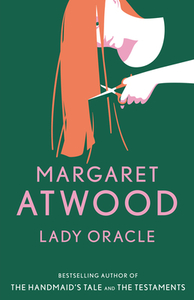Take a photo of a barcode or cover
mysterious
reflective
tense
slow-paced
Plot or Character Driven:
Character
Strong character development:
Complicated
Loveable characters:
Complicated
Diverse cast of characters:
No
Flaws of characters a main focus:
Yes
Very weird and slow and interesting. At times I wanted it to be a little faster, and I found the ending kind of unsatisfying, although maybe I just didn't understand it all the way. I felt that way about alias grace too so maybe it's a Margaret Atwood thing. Overall really liked it tho.
Moderate: Body shaming, Bullying, Fatphobia, Sexual content, Dysphoria
Really enjoyed this - got into it immediately, I was surprised by how much I related to the main character.
dark
mysterious
slow-paced
Plot or Character Driven:
Character
Strong character development:
No
Loveable characters:
No
Diverse cast of characters:
No
Flaws of characters a main focus:
Yes
Tied with The Handmaid's Tale as my favourite Margaret Atwood book. This one was decidedly less eventful but just as dramatic.
What I loved about it was that it was very character-driven, very psychological. It blended elements of the Gothic, of romance, and realism in order to theorize on escapism; particularly, on what escapism means to women (and men), and how it can shape our self-image and even our understanding of reality. A sharp-witted commentary on what it means to be authentic to yourself and, of course, on feminism. It's classic Margaret Atwood.
On a side note, I also loved that it was published in the 70's, so it felt like a glimpse back in time, especially since the setting focused on my hometown of Toronto.
There's so much here to unpack. I wish I'd had the opportunity to write an in-depth essay on this book when I was in school.
- It was super interesting how Joan's fiction about Charlotte and Felicia sort of reflected her own reality, but it was even more fascinating when "she" arrived at the centre of the maze and saw all those versions of herself.
- Redmond turning into Joan's past lovers, and then, finally, into Death, was very telling. Was Margaret Atwood implying that overly romanticized relationships can be the death of your true self? (i.e. that Joan would have to put on a "version" of herself in order to keep up the fantasy?). Or perhaps she was implying the death of a true and authentic love?
- I do doubt that Joan ever goes back to Canada to set things right. The reporter she met seemed sweet but if there was one thing he had in common with all her previous boyfriends, it was that he tracked her down (spied on her, in Arthur's case) when she very clearly did not want to be found. Was Atwood suggesting this new guy would be just as disappointing as the rest of them? Was Joan romanticizing again, just as she started talking about "coming clean"? The fact that she was already swooning over him being injured indicated she was dreaming. Her best friend was in prison for apparently murdering her, but she made it a priority to stay at the bedside of a total stranger.
- Just re-reading these thoughts, I'm realizing how absurd and hilarious this story actually is. Fantastic!!
- Margaret Atwood ended The Handmaid's Tale on a similar note: the sense of a hopeful future and a happy conclusion to the story, but when you actually read into it you realize nothing (or at least, very little) has changed. So subtle.
What I loved about it was that it was very character-driven, very psychological. It blended elements of the Gothic, of romance, and realism in order to theorize on escapism; particularly, on what escapism means to women (and men), and how it can shape our self-image and even our understanding of reality. A sharp-witted commentary on what it means to be authentic to yourself and, of course, on feminism. It's classic Margaret Atwood.
On a side note, I also loved that it was published in the 70's, so it felt like a glimpse back in time, especially since the setting focused on my hometown of Toronto.
There's so much here to unpack. I wish I'd had the opportunity to write an in-depth essay on this book when I was in school.
Spoiler
A few lingering thoughts:- It was super interesting how Joan's fiction about Charlotte and Felicia sort of reflected her own reality, but it was even more fascinating when "she" arrived at the centre of the maze and saw all those versions of herself.
- Redmond turning into Joan's past lovers, and then, finally, into Death, was very telling. Was Margaret Atwood implying that overly romanticized relationships can be the death of your true self? (i.e. that Joan would have to put on a "version" of herself in order to keep up the fantasy?). Or perhaps she was implying the death of a true and authentic love?
- I do doubt that Joan ever goes back to Canada to set things right. The reporter she met seemed sweet but if there was one thing he had in common with all her previous boyfriends, it was that he tracked her down (spied on her, in Arthur's case) when she very clearly did not want to be found. Was Atwood suggesting this new guy would be just as disappointing as the rest of them? Was Joan romanticizing again, just as she started talking about "coming clean"? The fact that she was already swooning over him being injured indicated she was dreaming. Her best friend was in prison for apparently murdering her, but she made it a priority to stay at the bedside of a total stranger.
- Just re-reading these thoughts, I'm realizing how absurd and hilarious this story actually is. Fantastic!!
- Margaret Atwood ended The Handmaid's Tale on a similar note: the sense of a hopeful future and a happy conclusion to the story, but when you actually read into it you realize nothing (or at least, very little) has changed. So subtle.
For my full review, please follow the link below:
https://www.bookwormadventuregirl.com/post/lady-oracle-by-margaret-atwood
https://www.bookwormadventuregirl.com/post/lady-oracle-by-margaret-atwood
funny
reflective
medium-paced
Plot or Character Driven:
A mix
Strong character development:
Complicated
Loveable characters:
No
Diverse cast of characters:
No
Flaws of characters a main focus:
Yes
Not my favorite Atwood. I was happy to reach the ending just to be free of spending any more time in the company of the protagonist. So happy that I forgot to be indignant about some things that were left unresolved until hours later.
There was some resonant stuff--primarily the idea that growing up as a fat kid is something that follows and scares you your whole life. But I also really hated her for being so utterly terrified of her fat self. It's a thin line between unlikability and mental illness with this character, I think.
Also, many of the themes and even scenes were very similar to things from Cat's Eye and The Robber Bride, both better books.
Three stars only because I can't give two to something so well written.
There was some resonant stuff--primarily the idea that growing up as a fat kid is something that follows and scares you your whole life. But I also really hated her for being so utterly terrified of her fat self. It's a thin line between unlikability and mental illness with this character, I think.
Also, many of the themes and even scenes were very similar to things from Cat's Eye and The Robber Bride, both better books.
Three stars only because I can't give two to something so well written.
adventurous
funny
reflective
medium-paced
Plot or Character Driven:
A mix
Strong character development:
Yes
Loveable characters:
Yes
Diverse cast of characters:
No
Flaws of characters a main focus:
Yes
5 stars for being beautifully and captivatingly written. It was slow at parts but it kept me intrigued. Joan’s character was the worst. I rooted for her in a way, especially with all she’d been through, but she was a mess, a person I never want to be like. Glad to have read my first Margaret Atwood book… don’t think I’ll be reading anymore.. not my kind of novel, but definitely entertaining
Honestly, how does Margaret Atwood come up with this stuff? Watching Joan, the main character, grow constantly more hysterical and make horrible decisions left, right and center was as frustrating as it was enthralling. Anyways, kudos to Atwood’s imagination because Wow, what the hell.




